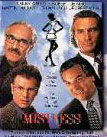|
|
|
|
Mistress
|
 |
|
Even over the counter at video shops, one often encounters the suspicion that feature films released direct to tape, without prior theatrical release, are somehow not real or legitimate films – and certainly not top quality product. The fact, however, is that increasingly fewer films receive the blessing of a cinema release, while anything considered even slightly risky or unfathomable as a market proposition is likely to end up on video. This means in effect that video has become the home for many of the most fascinating and important films of the day – films that create unusual moods, cross genres or explore unfamiliar content. Take Mistress, which is by any criterion an outstanding movie. As a behind-the-scenes exposé of Hollywood filmmaking, its belated release in Australia was perhaps timed to benefit from release on video of Altman's The Player (1992). Its milieu, however, is not the glitzy, high flying world of the big studios, but a seedy world of fallen directors, shady producers and small time entrepreneurs (as in In the Soup, 1992). The detailing of how a director's brave, personal project is progressively transformed by everyone who joins the deal recalls a cult video of a few years back, The Big Picture (1989) – but this is an altogether more melancholy affair. Mistress is the impressive directorial debut of actor Barry Primus, and is produced by his old colleague Robert De Niro – who also turns in a chillingly understated performance as a ruthless investor. Robert Wuhl plays the once-promising director whose dream project – the downbeat drama of a suicidal painter – is revitalised by independent producer Martin Landau. The potential backers all have the same condition: their mistresses must appear prominently in the finished movie. Primus' film (which he also co-wrote) is hilarious in its satire of the movie business, and its expertly choreographed tangle of disastrous liaisons, negotiations and misunderstandings. But it is also a black comedy, veering sharply into an arena of vicious psychological double binds and breakdowns between men and women. The only failing aspect of Mistress is an awful music score by Galt MacDermot – co-composer of Hair and obviously another old friend of the director. © Adrian Martin May 1993 |
![]()